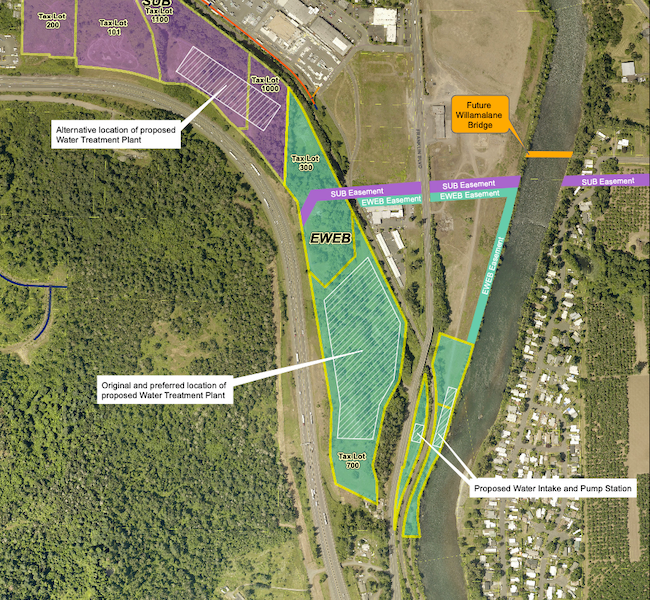
SPRINGFIELD – Two keywords drive the supply of drinking water: resiliency and redundancy. The Eugene Water & Electric Board has eyes for Glenwood’s section of the Willamette River to bolster both R’s for the region.
This week, Karen Kelley and Wallace McCullough, water operations managers, along with Rodney Price, assistant general manager, pitched to Springfield City Councilors the development proposal of a water treatment plant site in Glenwood.
The water and electric company is the largest municipal water utility in Oregon, despite having only one source of drinking water for the past 90 years: the McKenzie River. Developing a second source – the Willamette River – is a critical step toward achieving those two R’s, McCullough said.
“The plant’s not about growth. It’s about redundancy,” McCullough said.
EWEB has already upgraded and strengthened its McKenzie River Treatment plant, reservoirs, transmission pipelines, and emergency groundwater sources; however, the proposed Willamette River Water Treatment Plant will be EWEB’s largest resilience effort to date.
In the Pacific Northwest, drinking water utilities like EWEB are concerned about serving communities following the Cascadia Subduction Zone earthquake, not to mention persistent drought conditions, climate change impacts and forecasted population growth.
With the proposed plant, EWEB representatives said that their water system would become more resilient, enhancing its ability to help others in the region. With a source on the Willamette, its source water protection efforts would be extended to the Willamette watersheds, benefitting all downstream utilities and communities.
The proposed site, already owned by the company (identified in green on the map as tax lot 700) is preferred because it provides space needed for less expensive treatment processes, Kelley said. It also has enough space to “allow maximum flexibility for future plant expansion.”
Councilor Leonard Stoeher drilled down on if EWEB could move forward without support from the City.
“We want to partner with the City of Springfield because we will be complying with all the land use and development requirements and to build this site. There are also some amendments needed to the Glenwood Refinement Plan and the Springfield Development Code,” McCullough said.
Councilor Daien Pitts asked if the new site would both temporarily increase jobs and traffic congestion.
“Frankly, the biggest employment effect would be during construction of facilities itself,” McCullough said. Once the site is developed, traffic congestion would wane, and there would be only a few employees working from the site.
EWEB is working with its stakeholders and partners including the City, Springfield Utility Board and Rainbow Water District to understand their interests in the project, and will come back to the City with additional information about the proposed site. EWEB also plans to hold a development issues meeting for the project to confirm the various land use actions and permits required, and to navigate the land use and permitting processes to allow design and construction, should it proceed.
“It’s really in the best interest for Springfield to be part of this,” councilor Steve Moe said. “As an avid Glenwooder, I really want to see something happen here that would be an asset to the community.”
In other business:
• Last week, councilors adopted a resolution directing the development of an alternative plan for Main Street safety improvements. This action means the existing Draft Main Street Facility Plan, which included raised medians and up to nine roundabouts, is not moving forward for further consideration. Over the next nine months, the council will develop a different plan to address safety on Main Street. Community members can still submit their feedback through [email protected].
• Also last week, the council authorized the City to retain special legal counsel to assist with filing a legal challenge to new State rules if implemented as anticipated during its July 21-22 meeting. Oregon’s Land Conservation Development Commission plans to adopt permanent rules to meet the Governor’s Executive Order 20-04, known as Climate Friendly and Equitable Communities, which is intended to address issues of climate change and equity.
However, this rulemaking process has failed to reach its objectives and, as written, will adversely affect communities.
“The City Council and I want to see progress on climate change and equity issues,” said Springfield mayor Sean VanGordon. “However, the proposed rules are deeply flawed, inconsistent and too rigid.”
Among the issues with the as-written rules are impacts to housing, business and commercial development and transportation. The rules make it harder to add housing at a time when the Springfield community and communities throughout the state are facing a housing crisis. These requirements will limit housing types and homeownership opportunities and increase costs of housing construction in the mandated climate friendly areas.
Additionally, the City has been working to ensure development standards in the City are easier to comply with and more flexible to encourage development. The State’s new rules are so detailed it would make commercial development and the development process more cumbersome and expensive.
The Land Conservation and Development Commission plans to adopt permanent rules during the July 21-22 meeting that include only minor adjustments to the temporary rules the Commission adopted on May 19.








